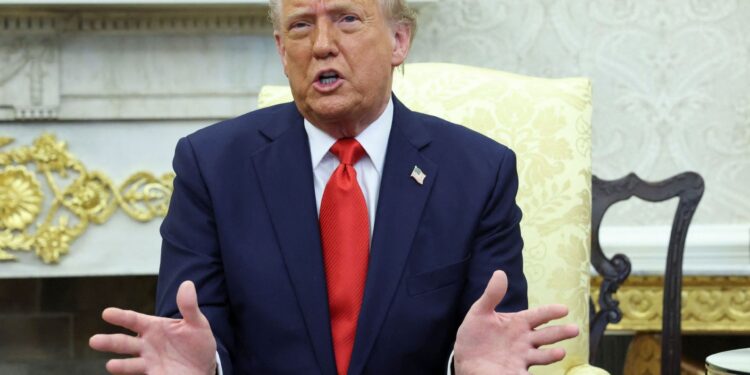Global tax plans targeting billions and multinationals are collided with a new reality during the era of US President Donald Trump.
Trump, a billionaire and one of the real estate poles, announced the United States from an international agreement that imposes taxes on multinational companies, which threatens to impose customs duties on countries targeting American technology companies, and these are glimpses of the current situation in this regard:
Technology companies taxes
The countries of the Amazon, Microsoft companies, the rocking of Google and Mita, who owned Facebook, have accused the local taxes.
On February 21, Trump issued a warning to countries that intend to impose taxes or fines on major technology companies and other American companies are “discriminatory and incompatible” or designed to transfer funds to local companies.
“My administration will move,” he said.
The move reopens the gap between Washington and its allies regarding taxes on digital services.
In his first term, Trump threatened to impose customs duties on American imports of champagne and cheese from France after the latter launched a tax on digital services in 2019, and 7 other countries have followed France since then.
The French government raised 780 million euros (887 million dollars) thanks to the tax last year.
The European Union is currently threatening to impose a tax on digital services if the negotiations related to Trump plans fail to impose customs duties of 20% on the products of the blocs.
As for Britain – which hopes to reach a trade agreement with the United States – it may review the taxes that it currently imposes on digital services and is 800 million pounds annually.
British Trade Minister Jonathan Reynolds said that the tax on digital services is “something that cannot be changed at all or we cannot open a discussion about it at all.”
https://www.youtube.com/watch?v=iudject4xgq
Corporate tax
About 140 countries concluded an agreement in 2021 to impose taxes on multinational companies that were negotiated under the auspices of the Organization for Cooperation and Development in the economic field.
The organization’s agreement includes “two corners” stipulating the imposition of taxes on companies in the countries where it reaps its profits, in a move aimed at reducing tax evasion, and mainly targeting giant technology companies.
As for the second pillar, it determines a minimum level at the global level of 15% adopted by about 60 countries, including Brazil, Britain, Canada, the European Union, Switzerland and Japan.
The director of the “Tax Corporation” – a non -profit American research center – stated that negotiations on the implementation of the first pillar “have been suspended for a while” even during the era of former President Joe Biden.
The French Press Agency quoted French -American economist Gabriel Zoqman as saying that the European Union’s reaction in the coming weeks “will be decisive.”
He added, “If the European Union and other countries surrender and allow American multinational companies to exempt themselves, this will unfortunately mean the end of this agreement, which is extremely important.”
Wealthy taxes
The efforts made to impose taxes on the people of wealth in the world are also stumbled.
Brazil took advantage of the period in which the 20 -pressure group headed to impose a 2% tax as a minimum on the net wealth of individuals whose assets are more than one billion dollars, a project that is estimated to collect up to 250 billion dollars annually.
The Biden Administration objected to this plan, and is unlikely to have any momentum with Trump’s presence in the White House, which is himself a billionaire and supporter to reduce taxes.
About a third of billions of billions in the world descended from the United States, as their number exceeds the number of those in China, India and Germany together, according to the American Forbes magazine.
During a conference in Paris recently, French economist Thomas Beckti reported that the world cannot wait for all the Group of 20 countries to reach an agreement.
“Countries should move individually as much as that,” he said.
“History proves that once a group of strong countries adopt this type of reform it becomes the standard,” he added.



